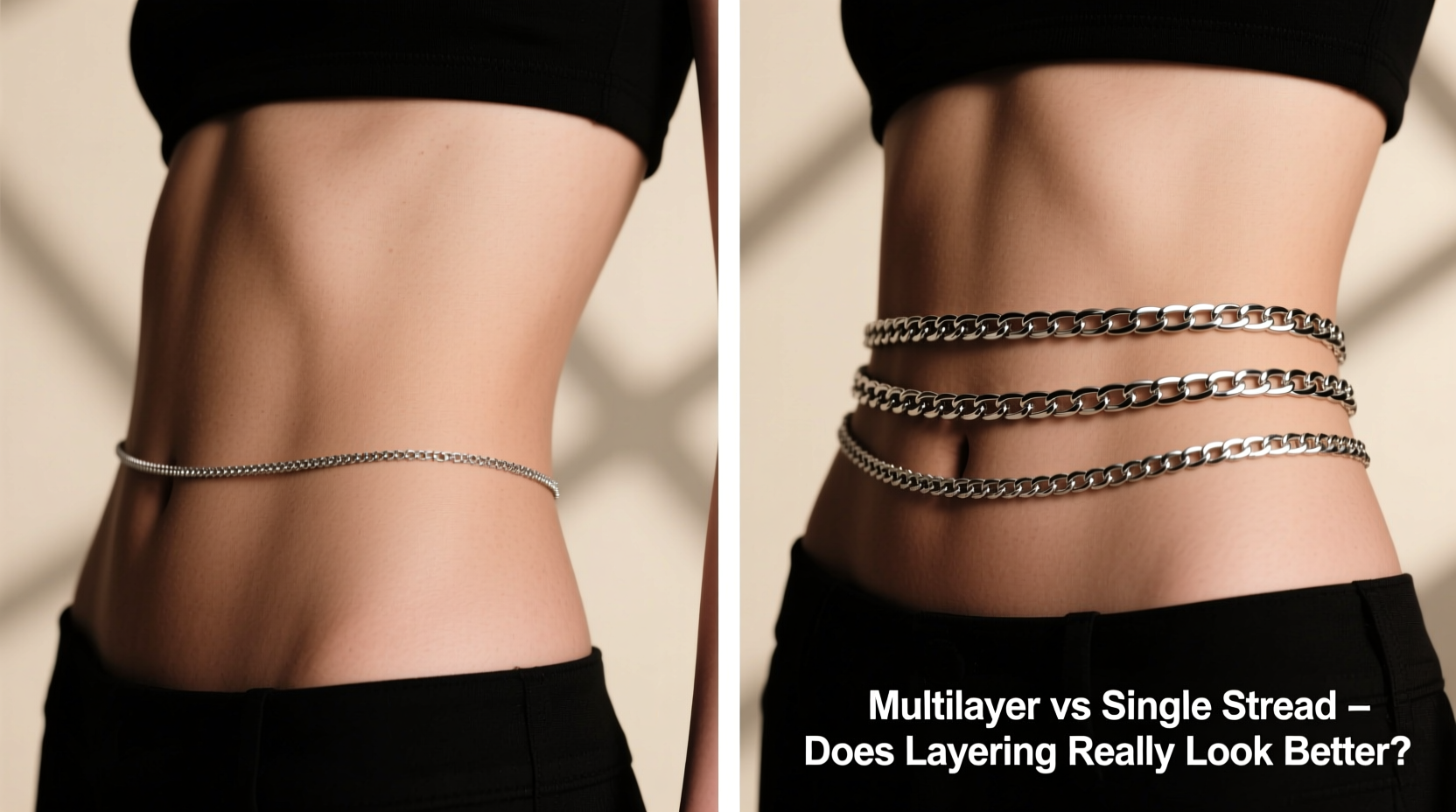The waist chain has evolved from a traditional cultural ornament into a modern fashion statement—worn by influencers, celebrities, and everyday style enthusiasts alike. Whether draped subtly beneath a crop top or boldly showcased over a saree, this accessory commands attention. But as styling options expand, a common question arises: is a multilayer waist chain inherently more attractive than a single strand? And does layering always elevate the look, or can it sometimes overwhelm?
The answer isn’t universal. It depends on body type, outfit choice, occasion, and personal expression. Understanding the strengths and limitations of both styles helps make intentional choices that enhance rather than distract.
The Single Strand Waist Chain: Simplicity with Impact

A single strand waist chain is exactly what it sounds like—a solitary chain wrapped around the waist or hips. Often delicate, sometimes bold, this minimalist approach focuses on clean lines and subtle elegance. Its strength lies in restraint. When worn thoughtfully, it draws attention to the natural curves of the body without competing with other elements of an outfit.
Single strands work exceptionally well with sheer fabrics, high-waisted silhouettes, or monochrome ensembles where a single metallic accent adds definition. Designers like Anita Dongre and Masaba Gupta often feature singular chains in their collections for precisely this reason—they complement without dominating.
This style also suits conservative settings or daytime events where understated luxury is preferred. A fine gold or silver chain with a small pendant—like a lotus, moon, or OM symbol—can carry symbolic meaning while maintaining aesthetic balance.
Multilayer Waist Chains: Boldness Through Complexity
Multilayer waist chains consist of two or more interconnected chains of varying lengths, textures, or thicknesses. These designs are inherently dramatic, designed to catch light and movement. They’re popular in bridal wear, festival fashion, and stage performances where visual impact matters most.
The appeal of layering lies in dimensionality. Multiple strands create depth, shadow, and rhythm across the torso. When crafted with intention, they mimic artistry—like cascading water or woven vines. However, this complexity demands careful coordination. Too many layers on a busy outfit can create visual clutter.
“Layered waist chains are powerful tools in storytelling through fashion. They don’t just decorate—they declare.” — Riya Mehta, Fashion Stylist & Cultural Accessory Curator
Designs may include mixed metals, beads, tassels, or charms. The key is cohesion. Even in multiplicity, there should be a unifying theme—such as matching metal tones or consistent spacing between drops.
Comparative Analysis: When to Choose Which Style
Selecting between single and multilayer waist chains shouldn’t be arbitrary. Consider these factors:
| Factor | Single Strand | Multilayer |
|---|---|---|
| Occasion | Daywear, office, casual dinners | Weddings, parties, festivals |
| Outfit Complexity | Best with bold or textured clothing | Suits minimal or solid-color outfits |
| Body Type | Flattering on all; emphasizes natural waist | Balances wider hips; adds volume at waist |
| Maintenance | Easy to store, rarely tangles | Requires careful untangling, prone to knots |
| Versatility | High—can be dressed up or down | Limited—often too ornate for daily wear |
This comparison reveals that neither option is objectively superior. Each serves different purposes and aesthetics.
Real-World Example: Priya’s Wedding Ensemble
Priya, a software engineer from Bangalore, was preparing for her sister’s wedding. She wanted to honor tradition while staying comfortable. Her lehenga was heavily embroidered with zari work and vibrant pinks and golds. Initially, she considered a three-layer waist chain with dangling bells and gemstones.
Her stylist advised against it. “The lehenga already has visual weight,” she explained. “Adding a layered chain will shift focus downward and feel unbalanced.” Instead, they chose a single, medium-thickness gold chain with a central mango-shaped pendant resting just above the hip line.
The result? Photos showed a harmonious silhouette. The chain enhanced her posture and drew eyes to her waist without competing with the embroidery. Guests complimented her “effortless grace.” This case illustrates how restraint can outperform extravagance when context is respected.
Actionable Checklist: Choosing Your Ideal Waist Chain
- ✅ Assess your outfit’s busyness—more detail means simpler accessories.
- ✅ Determine the event formality—layered chains suit grand occasions.
- ✅ Measure your waist-to-hip ratio—multilayers can accentuate curves if proportionally balanced.
- ✅ Try both styles in natural light before finalizing.
- ✅ Ensure the clasp is secure and comfortable for extended wear.
- ✅ Match metal tones to other jewelry (e.g., earrings, bangles).
Does Layering Really Look Better?
Not necessarily. While social media often glorifies stacked, intricate waist chains—especially in influencer-led trends—what looks striking in a posed photo may not translate to real-life elegance. Over-layering can lead to:
- Disproportionate emphasis on the lower torso
- Clashing with beltlines or garment seams
- Uncomfortable shifting during movement
- Difficulty sitting or bending naturally
Moreover, cultural sensitivity plays a role. In South Asian traditions, the waist chain (or *kamarband*) carries symbolic value—representing femininity, prosperity, or marital status. Reducing it to a purely decorative, trend-driven piece risks diluting its significance.
That said, layering done right is undeniably captivating. Two carefully chosen chains—one snug at the natural waist, another slightly looser over the hips—can create a sculptural effect. The secret lies in contrast: combine a smooth cable chain with a beaded one, or pair a matte finish with a polished link.
Frequently Asked Questions
Can I wear a waist chain if I’m petite?
Absolutely. A single, slender chain can elongate the torso when placed at the narrowest part of the waist. Avoid overly long or heavy multilayer designs, which may overpower a smaller frame.
Are multilayer waist chains suitable for daily wear?
Rarely. Most are delicate and prone to snagging on fabric. They also require regular polishing due to increased surface area. For everyday use, opt for durable single strands made of tarnish-resistant materials like stainless steel or alloy with anti-oxidation coating.
How do I prevent my layered chains from tangling?
Store them flat in a soft pouch with individual compartments. Before wearing, lay them out and gently separate links. Applying a tiny amount of clear nail polish to friction points can reduce metal-on-metal wear and knotting.
Final Thoughts: Style Is Personal, Not Prescriptive
The debate between multilayer and single strand waist chains ultimately dissolves when viewed through the lens of personal expression. There is no universal rule that layering “looks better.” What matters is alignment—with your body, your clothing, your values, and your moment.
A single chain can whisper elegance. A layered set can roar with celebration. Both are valid. The most compelling style choices come not from following trends, but from understanding why you're making them.
Experiment. Try a minimalist chain with jeans and a crop top. Drape a layered piece over a flowing maxi dress for a beach party. Pay attention to how each makes you feel—confident, restricted, radiant, burdened. That feedback is more valuable than any fashion dictate.









 浙公网安备
33010002000092号
浙公网安备
33010002000092号 浙B2-20120091-4
浙B2-20120091-4
Comments
No comments yet. Why don't you start the discussion?